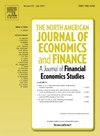Stock market vulnerability to US monetary policy: Evidenced from quantile coherency analysis
IF 3.9
3区 经济学
Q1 BUSINESS, FINANCE
North American Journal of Economics and Finance
Pub Date : 2025-09-02
DOI:10.1016/j.najef.2025.102536
引用次数: 0
Abstract
Turkey, Brazil, India, South Africa, and Indonesia are referred as the fragile five countries in 2013. Since then, however, the macro-economic environment of those countries has improved a lot. The objective of the study is to investigate whether the stock market of those countries is still vulnerable to US monetary policy using a novel quantile coherency methodology. The vulnerability is based on the general dependency structure at the quantile of joint distribution across frequencies. Besides, the pre and post 2013 dependency is compared to examine the effectiveness of macro-economic factors in controlling the impacts of the US monetary policy. Positive and negative dependencies were observed during conventional and unconventional quantitative easing and tightening respectively. Largely, it persists in the long-to-medium term across the state of the market. Domestic macroeconomic fundamentals seem to be relatively less effective in controlling the impact of US monetary policy. Thus, additional institutional reforms are required to make these markets resilient to global monetary policy shocks.
股市对美国货币政策的脆弱性:来自分位数一致性分析的证据
2013年,土耳其、巴西、印度、南非和印度尼西亚被称为“脆弱五国”。然而,自那时以来,这些国家的宏观经济环境有了很大改善。本研究的目的是使用一种新颖的分位数一致性方法来调查这些国家的股市是否仍然容易受到美国货币政策的影响。该漏洞基于频率联合分布分位数处的一般依赖结构。此外,对比2013年前后的依赖关系,检验宏观经济因素在控制美国货币政策影响方面的有效性。在常规和非常规量化宽松和紧缩期间,分别观察到正相关性和负相关性。在很大程度上,在整个市场状态下,这种情况会持续到中长期。在控制美国货币政策影响方面,国内宏观经济基本面似乎相对不那么有效。因此,需要进一步的制度改革,使这些市场能够抵御全球货币政策冲击。
本文章由计算机程序翻译,如有差异,请以英文原文为准。
求助全文
约1分钟内获得全文
求助全文
来源期刊
CiteScore
7.30
自引率
8.30%
发文量
168
期刊介绍:
The focus of the North-American Journal of Economics and Finance is on the economics of integration of goods, services, financial markets, at both regional and global levels with the role of economic policy in that process playing an important role. Both theoretical and empirical papers are welcome. Empirical and policy-related papers that rely on data and the experiences of countries outside North America are also welcome. Papers should offer concrete lessons about the ongoing process of globalization, or policy implications about how governments, domestic or international institutions, can improve the coordination of their activities. Empirical analysis should be capable of replication. Authors of accepted papers will be encouraged to supply data and computer programs.

 求助内容:
求助内容: 应助结果提醒方式:
应助结果提醒方式:


